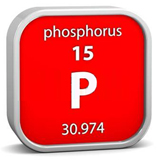Phosphorous - Uses, Benefits, Sources and Dosage

Phosphorous is considered as essential constituent of human bones. It is important nutrient for the normal functioning of body. It makes about 1% of our total body weight. It is found in the every cell of our body and plays an important role in the body functions. It supports the body to uitilise fats, proteins and carbohydrates for repair and maintenance of cells. Being a part of nucleoproteins, it regulates cell division and thus important in reproduction. Phosphorus when available in the form of phospholipids helps in the breakdown of fats and fatty acids so that body is not too acidic neither too alkaline. Phosphorus is the second most abundant mineral in human body which assists the calcium for integrity and good bone health. Besides providing strength to bones and teeth, phosphorus offers the other health benefits too like normal functioning of kidney, brain, heart and blood.
Benefits of Phosphorous
- Bone formation - Phosphorus is essential part of growth process as well as it helps in the maintenance of teeth and bones. It assists the calcium for the formation of strong bones. It also helps to maintain the good health of teeth enamel and gums. It helps to provide relief in the osteoporosis.
- Digestion - It plays an important role in the effective digestion in human body. It helps to resolve indigestion, diarrhea and constipation.
- Excretion and urination - It supports the healthy function of kidney and helps in the removal of waste material from body.
- Body strength - It helps to maintain the overall good health of body.
- It also supports the good sexual health.
- It helps in the muscles contractions like contraction of heart muscles.
- It helps the body for the formation of ATP.
Food Sources
Major food sources of phosphorous are protein rich food like milk, yogurt and soya foods. Shell fish, pork, cod, salmon and tuna also have the significant amount of phosphorous. Whole grains and cereal contain the good amount of phosphors than cereal or bread which are made from refined flour. Vegetables like beans, broccoli, potatoes, peas and lentils also have good amount of phosphorus.
Side Effects of High Intake of Phosphorous
Elevated levels of phosphate in blood are called as hyperphosphatemia. Due to the accumulation of phosphorous in blood there is muscle weakness, joint and muscle pains. People with increased phosphorus levels may experience itching and redness of eyes. Other complications associated with the high phosphorus levels are nausea constipation, vomiting and diarrhea.
Deficiency of Phosphorous
Low phosphorous levels in the blood are called as hyphophosphatemia. Due to this there is fall in energy levels in our body which results in fatigue, muscle weakness, weak bones, muscles and joint pains. Deficiency of phosphorus may lead to the anorexia, obesity, physical and mental exhaustion. It may also lead to nervous system disorders, arthritis, tooth decay and rickets.
Daily Intake Recommendation of Phosphorous
Infants
- 0-6 months requires 100 mg
- 7-12 months requires 275 mg
Children
- 1-3 year requires 460 mg
- 4-8 year requires 500 mg
- 9-18 years requires 1250 mg
In adults
- Adults 19 years and older requires 700 mg phosphorous.
- In case of pregnant women and lactating mothers it is needed 700mg.



